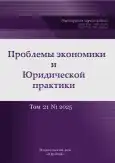Проблемы использования искусственного интеллекта в институциональной экономике
- Авторы: Кушнир А.М.1,2,3
-
Учреждения:
- Финансовый университет при Правительстве Российской Федерации
- Российский государственный университет им. А.Н. Косыгина
- Российский университет транспорта
- Выпуск: Том 21, № 1 (2025)
- Страницы: 181-187
- Раздел: Экономическая теория
- URL: https://journals.eco-vector.com/2541-8025/article/view/678492
- DOI: https://doi.org/10.33693/2541-8025-2025-21-1-181-187
- EDN: https://elibrary.ru/IPRIVL
- ID: 678492
Цитировать
Полный текст
Аннотация
Цель данного исследования заключается в установлении и системном описании основных проблемы использования искусственного интеллекта в рамках парадигмы институциональной экономики. В работе были аргументированы следующие выводы. Искусственный интеллект способен кардинально изменить экономику. Есть все основания полагать, что многие традиционные виды экономической деятельности в самое ближайшее время уйдут в прошлое, а им на смену придут иные подходы, увязанные с его платформенным использованием. Установлено, что искусственный интеллект снизит затраты и повысит производительность в различных отраслях, оптимизирует процессы принятия решений, позволит частично преодолеть когнитивные ограничения и предубеждения людей, генерируя многочисленные варианты решения хозяйственных задач. При этом каждая из указанных возможностей несет определенные риски и угрозы. Показано, что в теоретическом плане искусственный интеллект способен снизить проблему ограниченной рациональности, однако считать его инструментом решения основной экономической проблемы не представляется возможным. Использование искусственного интеллекта будет способствовать трансформации институциональных рамок, созданию новых рынков, новых норм и правил, которые с течением времени предопределят появление новых экономических институтов, которые будут оказывать определяющее влияние на развитие человеческой цивилизации.
Полный текст
Об авторах
Андрей Михайлович Кушнир
Финансовый университет при Правительстве Российской Федерации; Российский государственный университет им. А.Н. Косыгина; Российский университет транспорта
Автор, ответственный за переписку.
Email: Ku7@bk.ru
ORCID iD: 0000-0002-4318-0190
Scopus Author ID: 57219595324
доктор экономических наук, профессор департамента массовых коммуникаций и медиабизнеса; профессор кафедры экономики и менеджмента; профессор кафедры таможенного права и организации таможенного дела Юридического института
Россия, Москва; Москва; МоскваСписок литературы
- Brynjolfsson E., Rock D., Syverson C. Artificial intelligence and the modern productivity paradox: a clash of expectations and statistics. Cambridge, 2017. https://doi.org/10.3386/w24001
- Davidson S. The economic institutions of artificial intelligence // Journal of Institutional Economics. 2024. Т. 20. e20. Р. 1-16.
- Hayek F. The use of knowledge in society // The American Economic Review. 1945. 35(4), 519–530.
- Kiesling L. The knowledge problem. In Boettke P. and Coyne C. (eds), The Oxford Handbook of Austrian Economics. Oxford University Press, 2015. pp. 45–64.
- Meinke A. et al. Frontier Models are Capable of In-context Scheming. Apollo Research. 2024/ arXiv:2412.04984 https://doi.org/10.48550/arXiv.2412.04984
- Mises L. Socialism: An Economic and Sociological Analysis. Indianapolis: Liberty Fund, 1981.
- Mitchell M. Artificial Intelligence: A Guide for Thinking Humans. New York: Farrar, Straus and Giroux, 2019.
- Qin Y., Xu Z., Wang X., Skare М. Artificial Intelligence and Economic Development: An Evolutionary Investigation and Systematic Review // Journal of the Knowledge Economy. 2024. 15:1736–1770. https://doi.org/10.1007/s13132-023-01183-2
- Russell S.J., Norvig P. Artificial intelligence: a modern approach. A Modern Approach. Third Edition. Pearson, 2016.
- Simon H. A behavioural model of rational choice // The Quarterly Journal of Economics. 1955. 69(1), 99–118.
- Smith V. Rationality in Economics: Constructivist and Ecological Forms. Cambridge: Cambridge University Press, 2008.
- Williamson O. Markets and Hierarchies: Analysis and Antitrust Implications. New York: The Free Press, 1975.
- Бетелин В.Б. Научные проблемы обеспечения технологического суверенитета в области технологий искусственного интеллекта // Вестник Российской академии наук. 2024. Т. 94. № 7. С. 629-634.
- Дятлов С.А. Искусственный интеллект и ловушки цифровой трансформации // Известия Санкт-Петербургского государственного экономического университета. 2022. № 6 (138). С. 30-33.
- Никитаева А.Ю., Салем А.-Б.М. Институциональные основы развития искусственного интеллекта в промышленности // Journal of Institutional Studies. 2022. 13(1), 108–126. doi: 10.17835/2076-6297.2022.14.1.108-126
- Щербаков Г.А. Экономические аспекты искусственного интеллекта: современное состояние и текущие проблемы // Мягкие измерения и вычисления. 2023. № 92. Т. 70(2). С. 69–77; https://doi.org/10.36871/26189976.2023.092.008.
Дополнительные файлы








